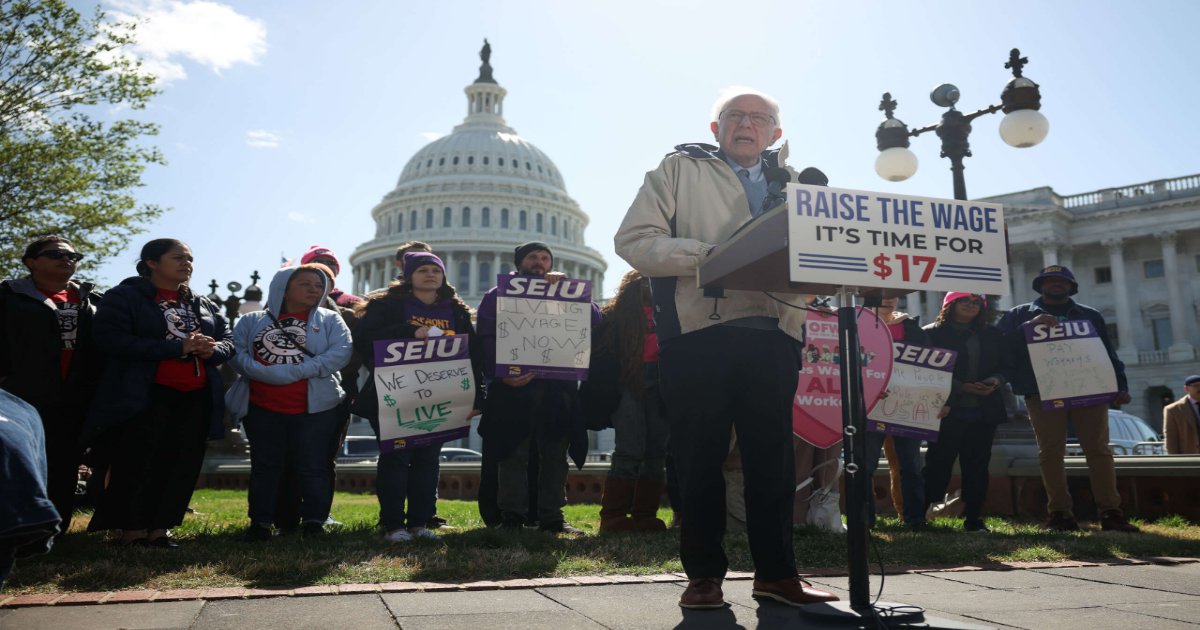With whirlwind tariffs and a looming trade war with China threatening to raise prices, government services halted by sweeping staffing cuts and Republicans in Congress moving to slash the social safety net to pay for tax cuts that would primarily benefit the wealthy, experts say the GOP agenda coalescing under President Donald Trump poses a “triple threat” to the economic well-being of millions of low- and moderate-income families in the U.S.
On the campaign trail, Trump wooed swing voters with promises to tackle the affordability crisis and make the United States “wealthy again.” The U.S is among the world’s richest nations, but inequality has ballooned since the 1970s as wages stagnated and incomes for the ultra-rich soared. Wealth is also disappearing from retirement portfolios as stock market values plummet in response to tariffs unilaterally imposed by Trump. Tariffs are taxes on imports the president is leveraging to initiate painful trade negotiations with other countries, but much of the cost is passed on to U.S. consumers.
After several days of watching the global economy suffer completely avoidable damage, Trump abruptly changed course and announced on Wednesday a 90-day pause on his steepest global tariffs, but kept sky-high tariffs on China, a top supplier of affordable consumer goods. Economists across the political spectrum have panned Trump’s approach to tariffs as flawed and warn that rising prices could cost the typical household up to $3,800 a year and spark a global recession.
Republicans in Congress may be wary (if not terrified) of challenging the president on tariffs and other destructive policies, at least in public, but they are already lining up against raising the minimum wage, a widely popular policy that would help protect workers and lower-income families from the potential economic fallout of Trump’s policy gambles.
Earlier this week, Sen. Bernie Sanders (I-Vermont) forced a vote on an amendment to the Senate budget resolution that would have called on lawmakers to gradually raise the federal minimum wage from a paltry $7.25 to $17 over the next five years. The Senate’s Democratic minority united behind the amendment along with one Republican, but the GOP majority voted against the minimum wage hike before sending the controversial budget blueprint to the House for approval.
Related Story
|
Trump’s tariffs threaten to widen inequality in the US, making the rich richer and impoverishing the working class.
Determined to make Republicans own their opposition to raising wages during a moment of acute economic anxiety and popular backlash to the Trump regime, Sanders and Rep. Robert C. “Bobby” Scott (D-Virginia) introduced the Raise the Wage Act of 2025 on Tuesday. Backed by 85 civil society groups and the vast majority of Democrats in Congress, the legislation would gradually increase the federal minimum wage to $17 by 2030. This would provide a pay raise for more than 22 million workers, or 15 percent of the U.S. workforce, according to the Economic Policy Institute.
Since Congress last raised the federal wage floor in 2009, the purchasing power of the $7.25 minimum wage has dropped by 32 percent to the lowest overall value since 1956, Sanders pointed out.
“We need the Republicans to understand that workers in their states can’t make it on $7.25 and $10 an hour, they have got to join us and help us raise that minimum wage to $17 an hour,” Sanders said during a press conference with labor activists on Tuesday.
As economists point out, raising the minimum wage would disproportionately benefit lower-wage employees in red states, particularly in the South, where workers have been left behind by decades of post-Jim Crow policies designed to maintain a pool of cheap labor. As a result, poverty rates across much of the South are higher than the rest of the country and often concentrated in Black and Brown communities.
“There’s some kind of mythology out there that the only people working for minimum wage are kids trying to make some extra spending money … and that is not the case,” Sanders said. “The vast majority of minimum wage earners are adults trying to make money to support their families.”
Last year, nearly one in four U.S. workers made less than $17 an hour, which is well below the living wage needed to make ends meet for a family of two working adults and at least one child in all 50 states. Meanwhile, workers saw the cost of housing and other essentials explode over the past two decades. In 2024, homelessness across the U.S. spiked by 18 percent. And last week, a Gallup survey found that 35 percent of Americans say they could not afford high quality health care if they needed it today, suggesting that lack of access has reached a new high in a nation that spends more on health care than any other.
“I sleep on the floor so my son can have the bed. I rent out rooms in my house just to keep a roof over our heads,” said Thomas White, a ramp worker at Dulles International Airport and member of Airport Workers United, during the press conference on raising the minimum wage. “I work full time at the airport and still can’t afford to live.”
The federal “subminimum wage” for tipped workers has been stuck at $2.13 per hour since 1991, and the current median wage for at least 38,000 workers with disabilities is just $3.50 per hour. The Raise the Wage Act would gradually phase out these subminimum wages for tipped workers, workers with disabilities and youth workers, assuring all workers earn at least $17 an hour by 2032.
While Trump has proposed eliminating taxes on tips in an effort to please working-class supporters, Republicans are still debating how to pay for such a policy without raising taxes on higher-income earners or adding to the federal debt, which many in the GOP oppose.
On the other end of the spectrum is Sanders, who argues that service workers are unable to stay out of poverty as long as the federal subminimum wage floor remains stagnant at $2.13 an hour plus tips.
“In the year 2025, in the richest country in the history of world, nobody should be forced to work for starvation wages,” Sanders said.
We’ve been here before. Along with a handful of progressive Democrats, Sanders has been the leading voice in Congress pushing for a minimum wage hike for years. In 2021, the House passed legislation to raise the minimum from $7.25 to $15 an hour, but it failed in the Senate despite a slim Democratic majority after eight centrist Democrats voted against the measure. Sanders introduced legislation to raise the minimum wage again in 2023 to push reluctant Democrats on the issue, but Congress failed to act before President Joe Biden left office.
Now that the GOP controls all branches of the federal government, a majority of Democrats in both the House and Senate are backing Sanders’s latest minimum wage push as party leaders prepare for a partisan showdown over federal spending reductions to pay for Trump’s signature tax cuts.
In a letter to GOP House Speaker Mike Johnson this week, Democratic Minority Leader Hakeem Jeffries challenged the Republican from Louisiana to a one-on-one debate over the budget resolution currently before the House. Jeffries and other Democrats say Republicans are playing games with the budget numbers to conceal from public view drastic cuts to Medicaid, Medicare and other popular programs that are needed to pay for tax cuts that “primarily benefit wealthy billionaires like Elon Musk.”
If Democrats are finally finding their voice when it comes to pushing back on Trump’s economic policies with their own ideas, then Sanders has just the legislation to rub in Republicans’ faces. After years of congressional inaction, the bill would finally raise the minimum wage past $7.25 as the fallout from Trump’s federal power grab and tariff gambit become painfully clear to millions of people.
We’ve borne witness to a chaotic first few months in Trump’s presidency.
Over the last months, each executive order has delivered shock and bewilderment — a core part of a strategy to make the right-wing turn feel inevitable and overwhelming. But, as organizer Sandra Avalos implored us to remember in Truthout last November, “Together, we are more powerful than Trump.”
Indeed, the Trump administration is pushing through executive orders, but — as we’ve reported at Truthout — many are in legal limbo and face court challenges from unions and civil rights groups. Efforts to quash anti-racist teaching and DEI programs are stalled by education faculty, staff, and students refusing to comply. And communities across the country are coming together to raise the alarm on ICE raids, inform neighbors of their civil rights, and protect each other in moving shows of solidarity.
It will be a long fight ahead. And as nonprofit movement media, Truthout plans to be there documenting and uplifting resistance.
As we undertake this life-sustaining work, we appeal for your support. We have 10 days left in our fundraiser: Please, if you find value in what we do, join our community of sustainers by making a monthly or one-time gift.
This article is licensed under Creative Commons (CC BY-NC-ND 4.0), and you are free to share and republish under the terms of the license.
On Bluesky? We created a starter pack to make it easy for you to follow Truthout folks there.

